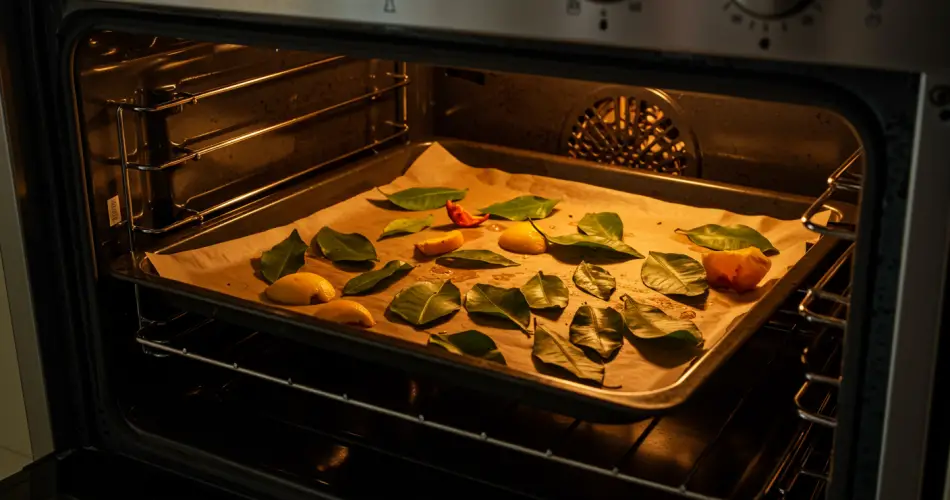When you buy fresh citrus fruits, such as oranges and lemons, it’s not uncommon to find them still attached to leaves. While many people discard these leaves as soon as they get home, doing so means missing out on a surprisingly useful household resource. Orange and lemon leaves, often considered mere waste, can actually serve multiple practical purposes, particularly when it comes to eliminating odors around the home.
The Value of Citrus Leaves
Citrus fruits are among the most widely consumed fruits, appreciated for their flavor, versatility, and nutritional content. Depending on the variety and region of cultivation, the harvest period generally spans from autumn to spring. While some citrus fruits are eaten whole, like oranges, tangerines, or grapefruits, others, like lemons, are primarily used for their juice.
In the kitchen, the focus is usually on the fruit itself. Lemon zest and grated citrus peel are often used to add flavor to dishes, baked goods, or beverages. Citrus peels also double as natural fresheners, commonly placed in drawers or cupboards to impart a pleasant aroma. Yet while the fruits themselves receive most of the attention, the leaves that accompany them are equally valuable.
Citrus leaves are rich in vitamins and essential oils, which make them excellent for culinary use, natural cleaning, and odor elimination. By preserving and utilizing these leaves, you can reduce waste, save money on chemical products, and harness their natural benefits.
Culinary Uses of Citrus Leaves
Although most people are unfamiliar with using citrus leaves in cooking, they are edible and can impart subtle, fragrant flavors to various recipes. Organic leaves that have not been treated with pesticides are ideal for preparing teas, infusions, and even certain baked or simmered dishes.
For example, a few leaves added to boiling water can create a fragrant citrus infusion that serves as a natural digestive aid or aromatic beverage. Similarly, leaves can be used to flavor rice, desserts, or savory stews, giving dishes a mild, fresh aroma that complements the natural flavors of the ingredients.
Citrus Leaves as Natural Odor Absorbers
One of the most practical uses of orange and lemon leaves is their ability to neutralize persistent household odors. This property makes them particularly effective in the kitchen, where ovens, refrigerators, and pantries can develop lingering smells from cooking or stored food.
To use citrus leaves for this purpose, a simple method is to dry them in the oven. Start by arranging the leaves on a baking tray lined with parchment paper. Set the oven to 180°C (356°F) on a ventilated or convection setting. Once the oven reaches the desired temperature, bake the leaves for approximately 10 minutes.
During this process, the leaves will release their natural essential oils. These oils have a powerful aroma that neutralizes unwanted odors, including those caused by burnt food. After just a few minutes in the oven, the scent will fill the kitchen and can linger throughout your home for days, leaving a refreshing and natural citrus fragrance.
Storing Dried Citrus Leaves
Once the leaves have been dried, they remain highly versatile. You can store them in open glass jars to help absorb odors in enclosed spaces such as cupboards, drawers, or refrigerators. This natural solution is not only environmentally friendly but also avoids the use of artificial deodorizers or chemical sprays.
Dried citrus leaves can also be combined with other aromatic household items, such as dried herbs or spices, to create a custom potpourri. This can be placed around the home to provide a continuous fresh scent while enhancing the décor with a touch of natural elegance.
Additional Benefits
Using citrus leaves offers several advantages beyond odor control. Their essential oils possess antibacterial properties that can contribute to a cleaner environment. Moreover, incorporating them into daily routines—whether in cooking, cleaning, or natural air freshening—helps reduce household waste, making it a sustainable practice.
Preserving citrus leaves also encourages mindful consumption of fresh produce. Rather than discarding parts of fruits that are often overlooked, utilizing the leaves highlights a more holistic approach to home management, blending practicality with sustainability.
Tips for Maximizing Their Use
-
Choose Organic: Whenever possible, select citrus fruits with organic leaves to ensure they are free from pesticides.
-
Proper Drying: Make sure leaves are thoroughly dried before storing them for odor absorption.
-
Reuse: Dried leaves can be used multiple times, especially for infusions or deodorizing jars.
-
Combine Aromatics: Pair leaves with cinnamon sticks, cloves, or dried herbs to enhance their fragrance.
-
Keep Handy: Always check for leaves when purchasing citrus fruits so you can take advantage of their uses.
Conclusion
Orange and lemon leaves are far more than decorative extras. Their rich essential oils and natural aromatic properties make them valuable for a variety of household applications. From neutralizing stubborn kitchen odors to enhancing culinary creations, these leaves are a versatile and eco-friendly resource that most people overlook.
Instead of tossing them into the trash, preserve your citrus leaves and put them to work. Whether dried in the oven to freshen your home or incorporated into teas and recipes, they offer a natural, affordable, and sustainable alternative to commercial products. By embracing this simple practice, you can enjoy a fresher, more fragrant home while making full use of every part of your citrus fruits.
Next time you buy oranges or lemons, take a moment to check for attached leaves—they may be small, but they hold remarkable potential for your household.



